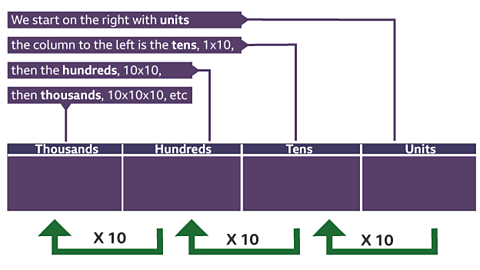Before reading this guide, it may be helpful to read the guide from M6 on solving equations.
Changing the subject of a formula
In most formulas, one variable is by itself on the left hand side (LHS) of the formula. This variable is the subject of the formula.
Changing the subject of the formula is a process of rearranging a formula so that a different variable is the subject.
In the formula \(v = u + at\), '\(v\)' is the subject of the formula as it the variable on its own on one side of the \(=\) sign.
If we know values for \(u\), \(a\) and \(t\) we can calculate the value of \(v\).
We may be asked to 'change the subject' of the formula so that one of the other variables is the subject and is on its own on one side of the \(=\) sign.
The process of solving a linear equation and the process of changing the subject are exactly the same.
Example
Make \(x\) the subject of the formula \(Mx + C = B\).
Solution
The process of changing the subject is the same as solving an equation.
Solve the equation \(\longleftrightarrow\) Make \(x\) the subject of the formula
\(3x + 2 = 17 \longleftrightarrow Mx + C = B\). ŌĆā Subtract C from both sides of the equation.
\(\qquad 3x =17 ŌĆō 2 \longleftrightarrow \ \ Mx = B ŌĆō C\). ŌĆā Divide both sides of the equation by M.
\(\qquad \ x =\frac{17 ŌĆō 2}{3} \longleftrightarrow \qquad x = \frac{B ŌĆō C}{M}\)
\(\qquad \ x = 3\)
Answer
\(x = \frac{B ŌĆō C}{M}\)
Note that we do not know the values of any of these variables and are not expected to arrive at a numerical value for \(x\).
Question
Make \(y\) the subject of the formula \(z = 9┬ĀŌĆō┬Ā3y\).
Answer
\(\qquad z = 9 ŌĆō┬Ā3y\) ŌĆā ŌĆā Add 3y to both sides of the equation
\(z + 3y = 9\) ŌĆā ŌĆā Subtract z from both sides of the equation
\(\qquad 3y = 9 ŌĆō z\) ŌĆā ŌĆā Divide both sides by 3
\(\qquad y = 3 ŌĆō \frac{z}{3}|\) or \(y = \frac{9 ŌĆō┬Āz}{3}\)
Both answers are equally correct
Changing the subject ŌĆō formulas with fractions
If the target subject is part of a fraction, multiply both sides by the denominator of the fraction ŌĆō just as you would to solve an equation.
Example
Make \(t\) the subject of the formula \(\frac{y}{t} = q\)
Solution
The process of changing the subject is the same as solving an equation.
Solve the equation \(\longleftrightarrow\) Make \(t\) the subject of the formula
\(\frac{12}{t} \ = 3 \longleftrightarrow \frac{y}{t} = q\) ŌĆā Multiply both sides by the denominator of the fraction, t.
\(12 \ = 3t \longleftrightarrow y = qt\)ŌĆā Divide both sides by q
\(t \ =\frac{12}{3} \longleftrightarrow t = \frac{y}{q}\)
Answer
\(t = \frac{y}{q}\)
Question
Make \(x\) the subject of the formula \(\frac{M + G}{x} = H\).
Answer
\(\frac{M + G}{x} = H\)
- Multiply across by \(x\)
\(M + G = xH\)
- Divide across by \(H\)
\(\frac{M + G}{H} = x\)
Answer
\(x = \frac{M + G}{H}\)
It is more usual to have the subject, in this case, \(x\), on the left-hand side (LHS) of the formula, but \(\frac{M + G}{H} = x\) is equally correct.
Test yourself
More on M6: Algebra
Find out more by working through a topic
- count1 of 5
